We've always been aware of covert alien activity on Earth. It is the best kept secret of the governments of the world: the populace at large, like a Men In Black plot, has no clue, and the world leaders along with their closest advisers aim to keep it that way. Slowly we benefit from whatever technology we can recover from abandoned sites while they remain out of contact. Their aims are unknown, and in their seclusion we have coexisted with our silent neighbors. Day to day the nations of the world continue about business as usual. But what if all that were to change? How would the world react if an unknown alien plot were a reality? Whether the aliens remain a secret, and whether they are truly friend or foe, has yet to be seen.

Watch the Skies , commonly referred to simply as a “mega game”, is what could best be described as a massive multiplayer roleplaying game; whereas a LARP encourages players to dress in costumes and fight with foam weapons, a mega game has no such requirements, instead centering on interpersonal interactions and dice in a way that makes it resemble the world's largest game of Dungeons and Dragons. They're also regularly much, much larger than a typical LARP, by definition taking an entire day to play and easily comprised of 60+ players, plus the team which organizes and runs the event. PAX East is already a few months behind us now, but I’ve needed the time to reflect on such a massive experience. It’s something I never thought I'd have the opportunity to do, and I gave up my third day of the convention Of PAX East.
Initial Feelings: excited!
Starting Slow, Starting Steady
Starting out, our team of five players chose to assume the role of the great nation of Japan. We were each given a general briefing along with one specific to the roles we would assume: head of state, deputy head of state, chief scientist, diplomat/UN delegate, and secretary of defense. Our general briefing stated two things: firstly, aliens had been living covertly on Earth, but they were both non-aggressive and out of contact (this was a secret shared only by the world’s leaders). Secondly, as Japan, our national goals were to remain a world leader in technological advances and serve the needs of our people. Our populace would turn against us if we became overly militaristic, and while they favored protecting the homeland, anything further might lose the approval of our imaginary citizens. Unlike nations such as Russia or the USA, we possessed no nuclear arsenal.
As I wanted to experience the full, imaginary weight of a nation on my shoulders about as much as the rest of my team cringed at the thought, I volunteered for the role of head of state (in the case of Japan, that meant Prime Minister). I would be the face of our nation to the public at large, our main line of communication to other heads of state and the media, and I would also be responsible for balancing our nation's budget every turn, supplying my teammates with the funds they would need to complete tasks furthering our goals. Major decisions would come to me as my team reported back from their various areas of interest and I would have to steer our team, and our nation, towards the bright future we all looked towards. That question, what a “bright future” meant to a nation, faced each team of players. A dozen or so countries each with their own definition of what this “win condition” looked like, side by side playing this open-ended Massively Multiplayer RPG. With some jitters, I looked over my papers. Then, the game's relentless turn timer began its countdown.
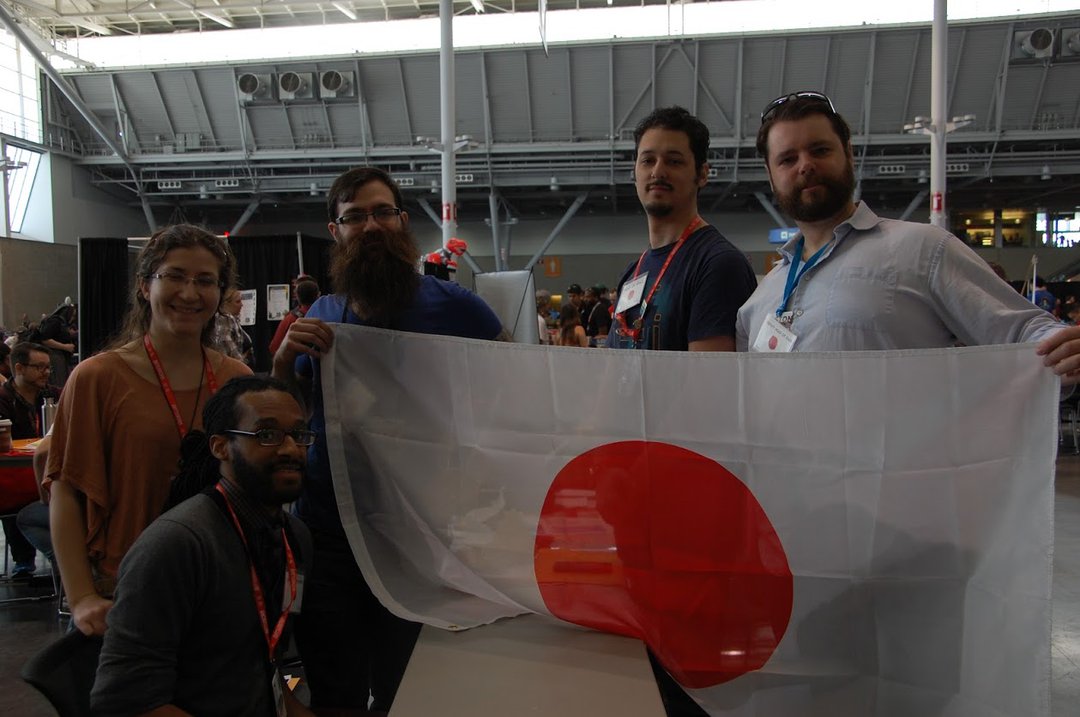
Glorious Team Japan! We really have no idea what we've signed up for, by this point.
As my other team members left for their various first turn tasks, held at special stations that only they were allowed at, I began to attend to matters at home. My “minigame” was confined to the area in which the various nations’ tables were housed, and I was not allowed to stray into other areas like the Defence Map or the UN Council. Balancing the budget, despite the game masters' caution that this was tough, seemed remarkably straight-forward. As Japan lacked a formal military and nuclear weapons, it seemed we had plenty of money to focus into public works and technological advancement. We even had a surplus to put into positive media campaigns and diplomatic priorities. A perfect opportunity to double down on positive PR that I knew would come in handy once the game geared up, while continuing to make sure Japan remained the technological leader it's always been. I also made a point of visiting several of the other heads of state on the first turn, introducing myself and seeing who was friendly towards us; more than likely due to their own briefings, countries like Germany, France, UK and the USA seemed like favorable allies while countries like Russia seemed primarily concerned with their own affairs. In addition to the major powers, I also introduced myself to some up and coming countries like India and Brazil.
The game was off to its early stages at this point with no aliens in sight. For a game called Watch the Skies, this might seem rather odd. With about a dozen or more players controlling the alien team (in a hidden location out of sight of the rest of the players), one would expect more action right from the get-go. But a game of Watch the Skies is about the humans as much as it is about the aliens, and the stories that those humans tell through their experiences. In these early turns, the game’s tutorial rounds you might say, I was just coming to terms with things like my own mini-game and the Russian president’s cold shoulder. Full blown alien chaos was just around the corner.
Current feelings: confident and optimistic
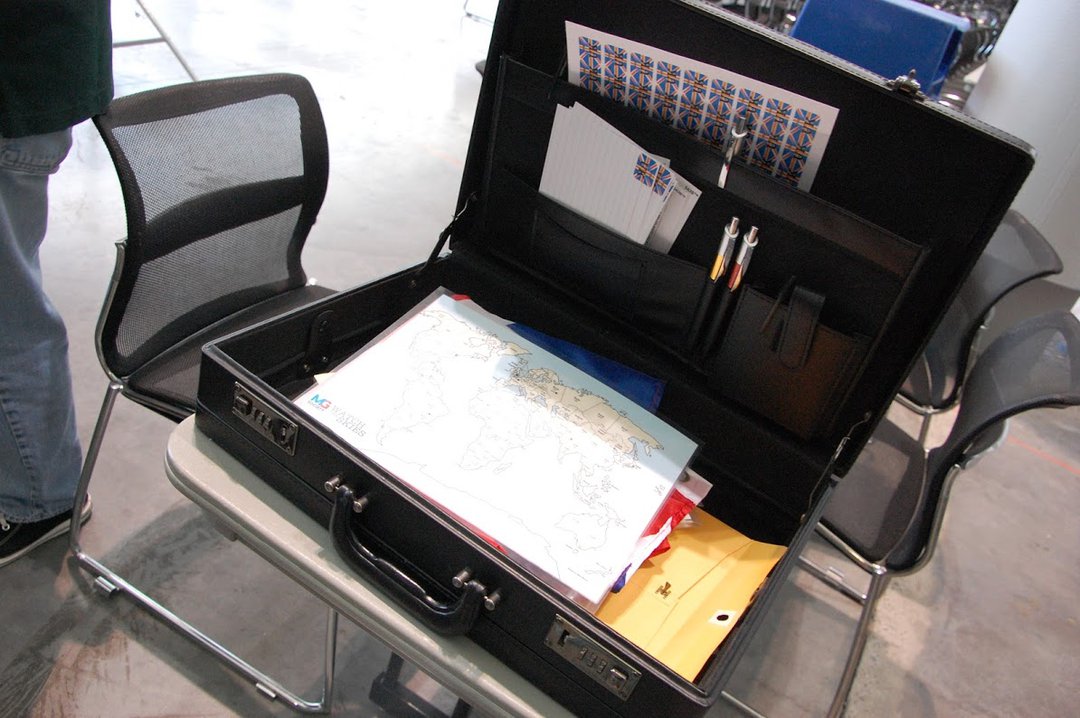
One of the game's many briefcases that heads of state are responsible for. My budget money was handed to the GMs each turn in this; it would be my own personal war.
Politics As Usual
Part of the beauty of these mega games is the political intrigue that runs through them. Players are encouraged to follow their personal and national briefings, as these provide various bonuses (or avoid penalties), but nothing stops them from taking control of the game in any way they wish. In one such surprising incident, I was approached by the Chinese head of state who wanted to apologize for aggressive and concerning actions in the region, and lay out groundwork for peaceful cooperation. I found myself immediately torn between the meta consideration of a player who wasn't comfortable with a confrontational China, seeking to alter the world's politics to suit his playstyle, and the very real possibility this was just the latest political ploy. As credit to the game's theme, I found myself siding more with my imaginary populace and asking for concessions from China, such as ceasing the expansion in the South China Sea, before making any more formal moves towards cooperation between our nations.
Old rivalries die hard though, and with alien activity increasing on the fringes, there was a rush for shiny new technology worldwide. Lines were being drawn, and as the turn timer (publicly displayed on a projector screen) marched into turns two and three, the world was already dividing. The major Western powers wanted Japan to join up and pool resources against an aggressive and growing communist alliance. The problems of not having a formal military were becoming more apparent, and I realized diplomacy was our only shield. We were in the same region as Russia and China, who were also pulling to have Japan join with them, so suddenly our diplomatic relations were teetering on a knife edge. To make matters worse, smaller nations like India and Brazil had yet unannounced allegiances. They might swing the balance in either direction. Hoping to convince China, who had previously approached me in friendship, of leaving Russia, who seemed primarily concerned with using alien tech to develop weapons, I strategically pushed our Western allies to swing India and Brazil to “our cause”. The political intrigue gears were turning! If we could get most of the world on the same side, and I could drag China along, I figured it might be enough to convince Russia to stop such selfish actions as weapons research and focus on the real issues. Issues like what the heck was up with the recent alien activity and if there might be bigger threats abroad. None of us still had any clue what the plot at large held in store.
And that was when all hell broke loose.
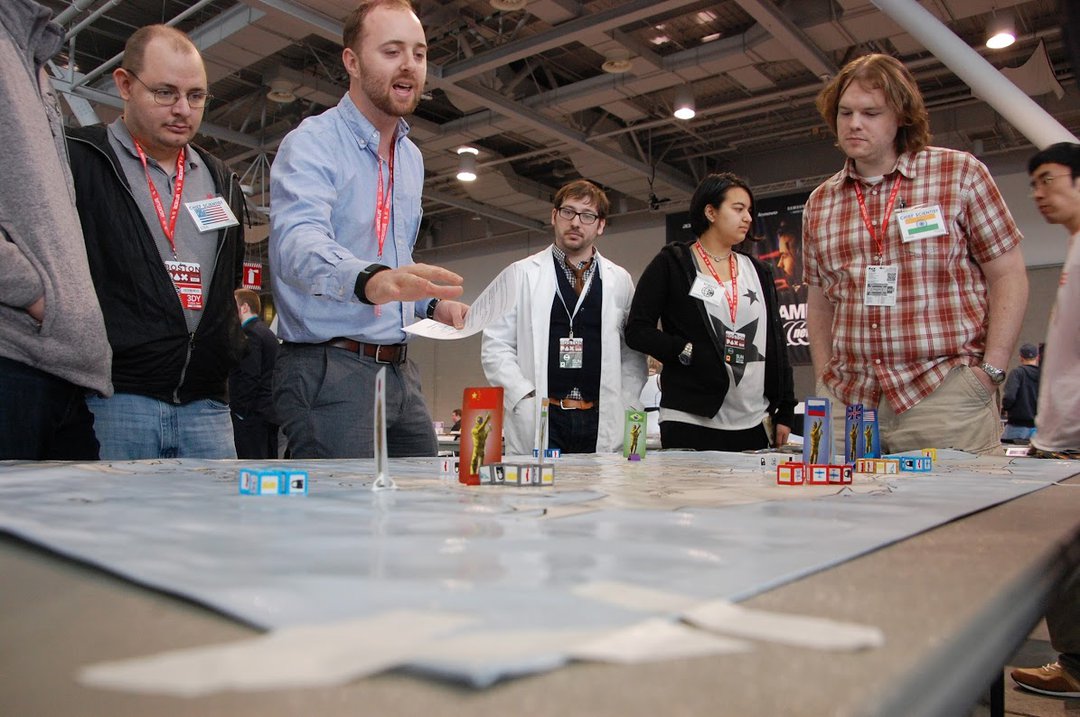
A heated debate amongst the chief scientists of the world.
Aliens Among Us
In a game of Watch the Skies, players control more than just the major nations of the world. The alien faction isn't played by the organizers, but by players with their own motivations and goals. And depending on the scenario for the day, other factions might also be present. The world media groups, of which there were three in this particular game, were that extra unknown for us. Everyone has their own agenda and vision of what “winning” the game should look like, and so while you would think this should be an XCOM-esque "Us versus them", you aren't sure who is actually the real problem. Imagine then the narrative that develops when over a dozen different groups begin playing tug-of-war with the story. One of the media groups, in competition with their rivals, assembled enough “proof” of alien activity and decided the best thing to do with it would be to go public. Since most governments were trying to keep the aliens out of sight, we were faced with attempting to discredit the media, or conduct illegal black ops to silence them. However, many teams (including Japan) decided that, our hands forced under overwhelming proof, we had to preempt the broadcast and go public with this most volatile of information: humans weren't alone in the galaxy and world leaders had known about extraterrestrial life for some time. I've heard that prior mega games have played host to an entire spectrum of personalities in their roleplay storytelling. Not everyone has another's best interests in mind, and some mega games have had very antagonistic mindsets driving them. Our particular version of Earth, though, was starting to be one of united cooperation in the face of possible alien attack and anything that might divide us.
Using the situation to our advantage, our creative players/world leaders decided to up the stakes on the alliance lines that had been drawn and create a worldwide global research cooperative to investigate the aliens. Even Russia, under the political pressure of having to act on their own, decided to join up for what was perceived by all as the Earth uniting against an alien threat of unknown intent. And so, with various growing crises facing the human race, from biological contamination in Russia (likely of their own making), to unexpected monster attacks in Europe (certainly not of our own making), our heads of state and their closest advisers banded together for a common cause.
Current feelings: exhilarated, uncertain, and still hopeful
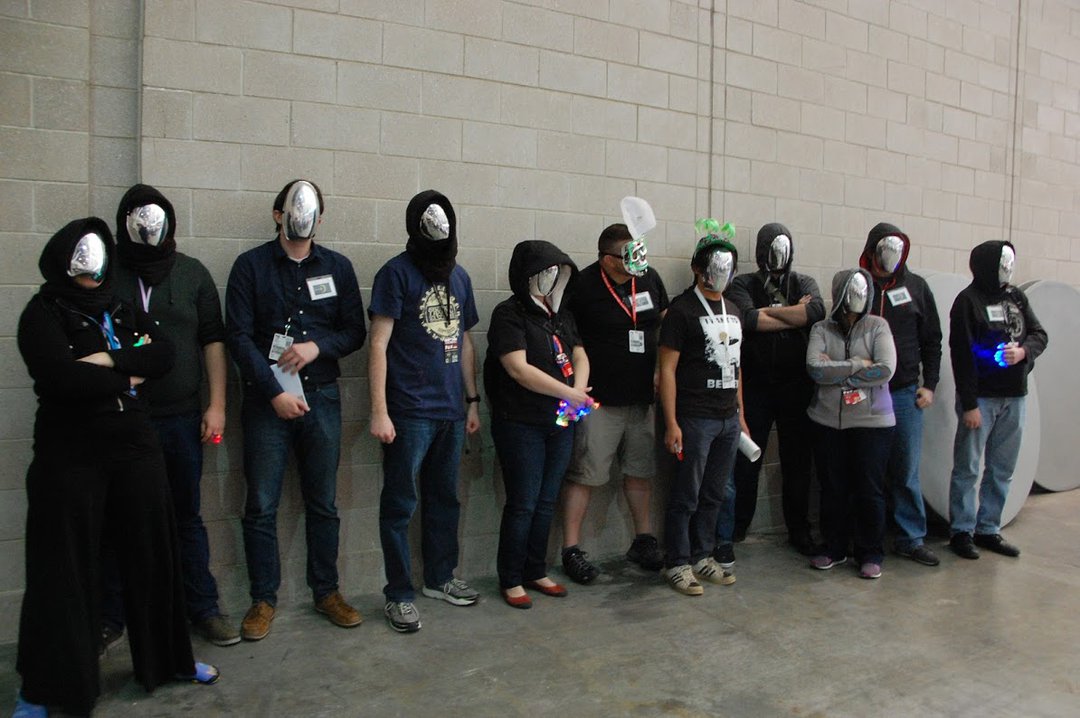
The alien team, incognito to the end.
Panic Control
Then things got even worse. That game clock I mentioned earlier, the one that denotes when a turn is over, moves at a relentless 30 minutes per round. Within each half hour cycle, each player is responsible for playing their own mini-game related to their particular job function. Mine was balancing the budget and conducting Japan's diplomatic relations with the other nations and the media. As more and more crises cropped up across the globe and global panic increased, I began feeling like I was less and less in control of things. If you've ever seen one of those cooking competition shows on TV, you'll know what I'm talking about; the chefs or bakers would have little problem completing their dishes perfectly if not for the incredibly tight time constraints they're put under. Under the pressure of the clock, composure cracks and failing plans are replaced by gut decisions. I knew my defence minister was helping to fight monster attacks that I had no control over. The game was at a point where you start to cross your fingers and hope for the best.
That budget surplus we'd started the game with? Now, I didn't even have enough money to properly direct our national media to calm the mass hysteria sweeping through the streets. Where was all the money going? My defense advisor told me we needed to keep some interceptors in the air to reduce panic and respond to threats. My UN delegate was constantly asking for funds to help the other nations and address global issues. My head scientist needed his allowance to keep our edge on technological superiority, probably our biggest advantage. And my deputy head of state was always looking for a bit of extra money to track down and purchase alien gadgets (admittedly I probably gave him the short end of the budget stick). There was never enough money, and now that there was an ever-growing series of catastrophes on Earth, it was no exaggeration to say that there were moments I'd be walking my budget up to the GMs while in mid conversation with two other world leaders. Somehow, during this panicked section, where we could lose before the real end game was revealed, the country didn't collapse.
Current Feelings: rushed and frayed
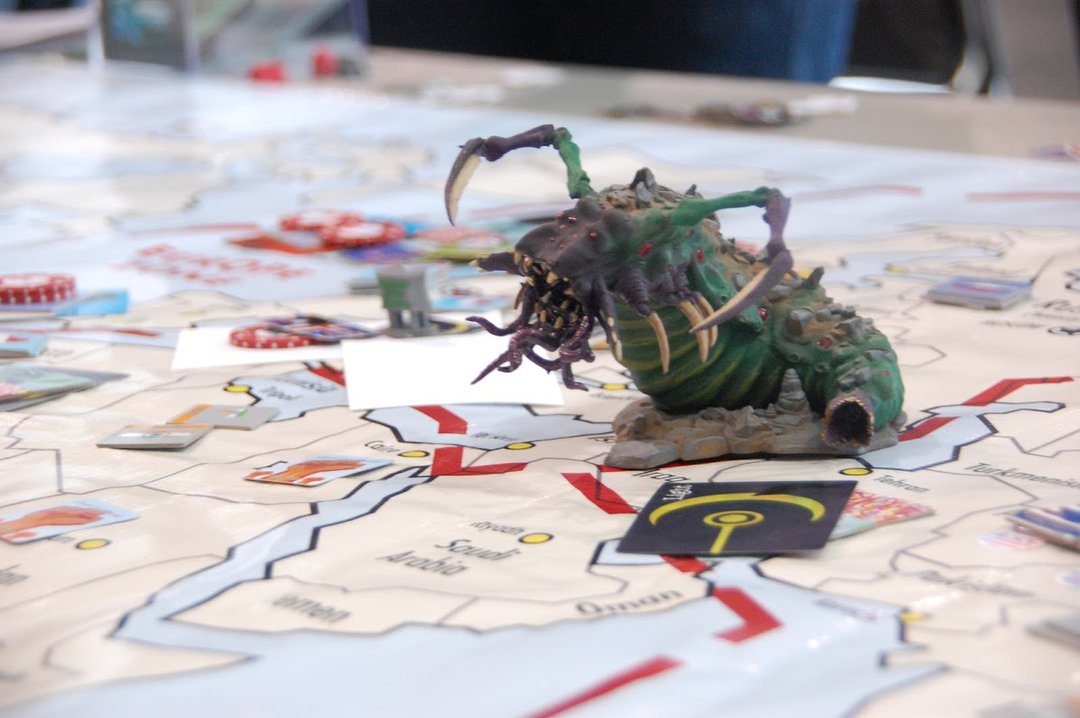
This is one of the many threats my poor defense minister had to deal with. I really should get him a thank you card...
Figuring Out The Puzzle
Despite our best efforts as a world united in research, every time the world nations conquered one problem, a newer more dangerous one would spring at us from around the corner. At this point in the game, no longer silent or secretive, aliens were giving regular broadcasts to the world as massive monsters ravaged cities worldwide. The aliens, while seemingly non-aggressive at first, grew more and more duplicitous.
In one moment a carrot of friendship would seemingly be offered, perhaps in the form of a radiation cleanup facility to help poor, ailing Russia. The next, Earth would receive yet another broadcast telling us to lay down and die to the city-ravaging monsters. It was as if there were two factions of aliens at odds with each other. ...I suggested this to the other world leaders, since we were all now good friends, and it was as if a light bulb had gone on, further illuminating the plot. There were two factions of aliens warring over the fate of Earth. But why? Alongside these developments, the GMs were informing the nations of the world that our citizens were manifesting comic book style super powers, and it was these people the bad aliens seemed to be targeting. None of us mistook this coincidence. With the end game nearing, we reached out to the good aliens and confirmed their intent to help humanity regain a power it had sealed away long ago. It was our destiny to rejoin and rule the stars. Those who feared humanity’s power were trying to stop it from fully coming to fruition.
Of all the possible Watch the Skies scenarios, this was our plot. This was our story and our dilemma that we had sussed out as a team of allies. The aliens may have been the draw for me to play this game, but in our narrative, they were the catalyst that served to highlight a story about the strength of humanity and friendship.
In what we all knew to be the final turns of the game, it was as if the conflict was turned up to 11. Aware of the dangers, the confrontational aliens came at Earth in full force. Old rivalries were forgotten and the nations of the world came together as an Earth coalition. Nukes were launched in defense of human lives. An Independence Day 11th hour speech was delivered to the frightened peoples of the world. Humanity came together in a way no one would have thought possible at the outset of the game. But a game of Watch the Skies isn't won or lost in the same manner as a board or video game. After all, a story driven game as epic as Watch the Skies could go on indefinitely. Instead the GMs take the momentum of the game along with a final statement of goals and final actions by the players and construct an epilogue. Would ours contain the glory of taking to the stars, or would it be an epitaph carved on our collective tombstone?
Current Feelings: wait, are we all actually going to die in the epilogue?
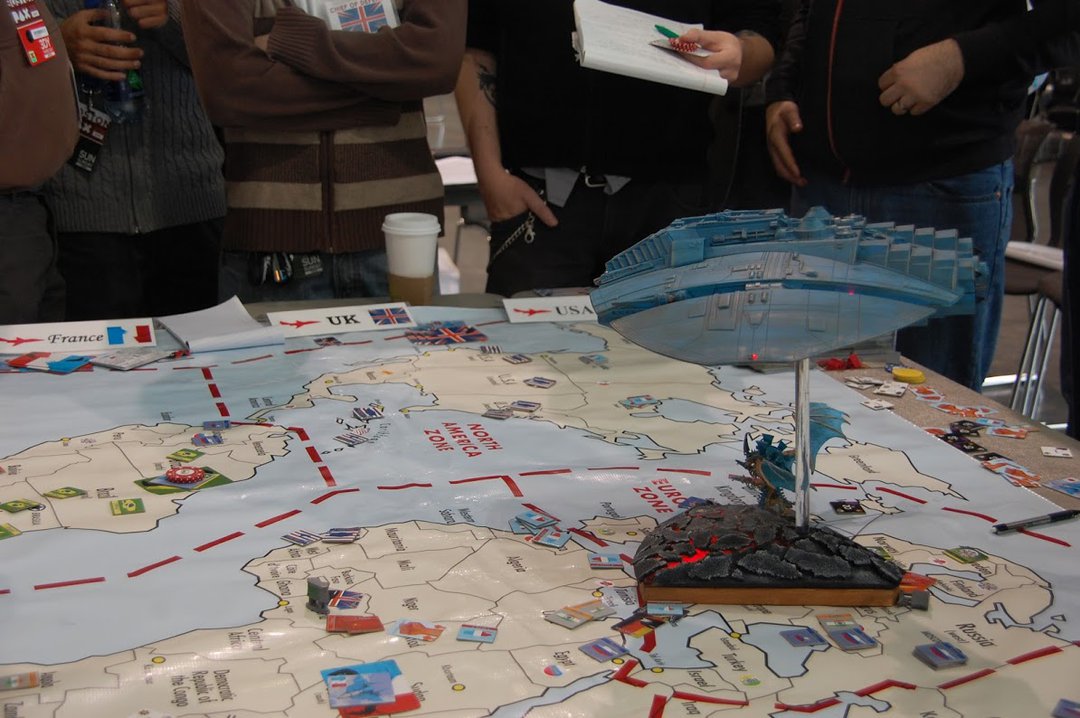
I got a message from the "good" aliens minutes before this showed up over Berlin. It said only, "Get out now."
Curious how it all ended? Stay tuned for part two with the exciting conclusion where we answer such questions as, “What does it all mean?” And also I dive in depth into what makes these mega games such an amazing experience. If you’re interested in finding out if there’s a megagame being held near you, check out the Megagame Society’s Facebook page for a listing of events.